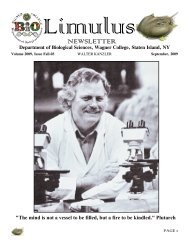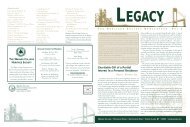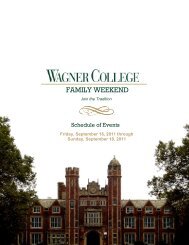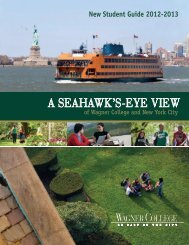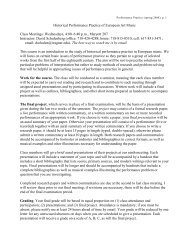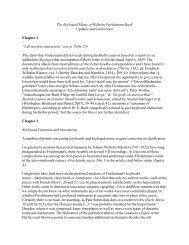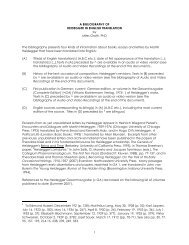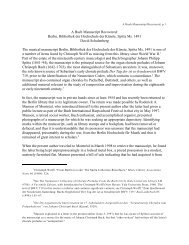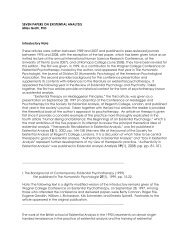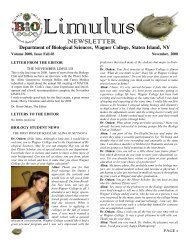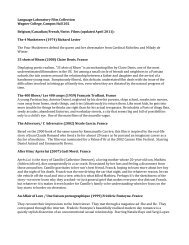The Sonate auf Concertenart: A Postmodern Invention? David ...
The Sonate auf Concertenart: A Postmodern Invention? David ...
The Sonate auf Concertenart: A Postmodern Invention? David ...
You also want an ePaper? Increase the reach of your titles
YUMPU automatically turns print PDFs into web optimized ePapers that Google loves.
<strong>Sonate</strong> <strong>auf</strong> <strong>Concertenart</strong>, p. 11<br />
find no recognition in the encyclopedic works of Scheibe's immediate predecessors Mattheson and<br />
23 Walther. And only in much later accounts--those of Riepel and, especially, Koch--does the<br />
modern view emerge of concerto movements as formal and, to some degree, expressive or<br />
dramatic counterparts of the ritornello-form aria. 24<br />
We might attribute the cursory nature of the earlier accounts to the conservatism typical of<br />
lexicographic writings in general; in 1713 Mattheson, for example, still viewed the strophic aria as<br />
the norm and the ritornello of an aria as falling properly between its stanzas--despite the<br />
25<br />
predominance of da-capo form in contemporary arias, including his own. But even Scheibe, in<br />
his discussion of the <strong>Sonate</strong> <strong>auf</strong> <strong>Concertenart</strong>, refers not to form but to texture as the basic<br />
criterion of the genre: what matters above all is that one instrument stands apart and above the<br />
26<br />
rest, dominating the ensemble. This is an echo of Walther's and Mattheson's understanding of the<br />
Worte dem Componisten an gewisse Anmerkungen binden: so hat er hingegen im Concerte <strong>auf</strong><br />
die Stärke des Instruments und <strong>auf</strong> die Ausführung seines zum Grunde gelegten Hauptsatzes zu<br />
sehen" (p. 632). Likewise, "Was also daselbst von der Singstimme bemerket worden, das kann,<br />
mit veränderten Unständen, <strong>auf</strong> die Concertstimme ausgeleget werden" (ib.).<br />
23<br />
<strong>The</strong> definitions of ritornello given by Walther and Mattheson refer only to vocal music;<br />
see Walther, Praecepta der musicalischen Composition (lost MS dated 1708), ed. Peter Benary<br />
(Leipzig: VEB Breitkopf und Härtel, 1955); idem, Musicalisches Lexicon oder musicalische<br />
Bibliothec (Leipzig: Wolffgang Deer, 1732; facs. ed. Richard Schaal, Kassel: Bärenreiter, 1953);<br />
and Mattheson, Das neu-eröffnete Orchestre (Hamburg: Benjamin Schillers Wittwe, 1713).<br />
24<br />
Joseph Riepel, Anfangsgründe zur musikalischen Setzkunst, 5 vols. (Regensburg,<br />
1752-68), esp. 2: 93ff. (pp. 1: 199ff. in facsimile in Joseph Riepel: Sämtliche Schriften zur<br />
Musiktheorie, ed. Thomas Emmerig [Vienna: Böhlau, 1996], 2 vols.); and Heinrich Christoph<br />
Koch, Versuch einer Anleitung zur Composition, 3 vols. (Leipzig, 1782-93), ii.4.4.1.10.120 (p.<br />
210 in the partial translation by Nancy Kovaleff Baker as Introductory Essay on Composition:<br />
<strong>The</strong> Mechanical Rules of Melody, Sections 3 and 4 [New Haven: Yale University Press, 1983]).<br />
On Koch, see Jane Stevens, "An Eighteenth-Century Description of Concerto First-Movement<br />
Form," Journal of the American Musicological Society 24 (1971): 85-95.<br />
25<br />
Mattheson, Das neu-eröffnete Orchestre, 183-4. Strophic arias remain common in<br />
German cantatas from the first two decades of the eighteenth century, as in the works by<br />
Telemann and Heinichen cited below.<br />
26<br />
"Ein Concert aber ist ein solches Stück, in welchem ein Instrument oder mehrere<br />
Instrumente, unter den übrigen Instrumenten, die ihnen zur Begleitung zugegeben werden, <strong>auf</strong><br />
eine außerordentliche Art hervorragen, also, daß sie zugleich ihre Eigenschaft durch besondere<br />
Sätze bezeigen, und dadurch den andern sie begleitenden Instrumenten gleichsam den Vorzug<br />
abstreiten" (pp. 630-1).



